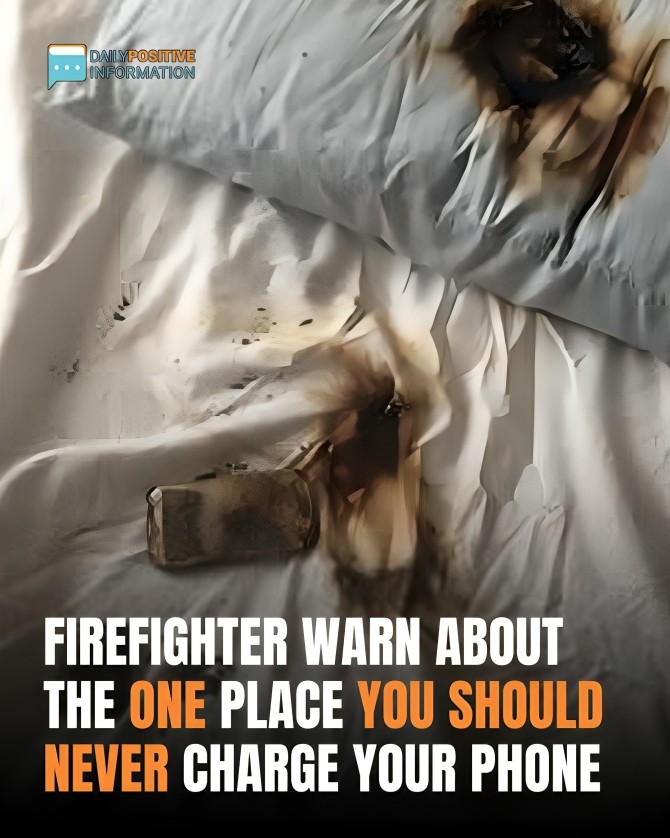Firefighters are raising the alarm about a dangerous habit that many people don’t even realize could put their entire home at risk. Every night, millions of people go to sleep with their iPhones charging beside them—sometimes even tucked under their pillow. While it may seem harmless or even convenient, this routine could spark a fire while you sleep.

Fire safety experts in the UK, including Clean Air UK and the London Fire Brigade, have identified this common practice as one of the leading causes of household fires. The danger lies in the combination of heat buildup and the nature of lithium-ion batteries found in most smartphones. When a phone is charging under a pillow or on bedding, the lack of airflow causes heat to become trapped. This can cause the battery to overheat, swell, or even explode. Firefighter Mark Sutherland warns that many people assume their phones are safe, but once heat starts to build and can’t escape, disaster can strike in a matter of minutes. By the time you smell smoke or notice something is wrong, the fire may already be spreading.
Real incidents back up these concerns. In November 2022, a family in Buckinghamshire experienced a bedroom fire started by a phone charger left on the bed. The bedding caught fire, and the blaze spread rapidly before firefighters were able to contain it. What makes these fires so dangerous is how quickly they ignite and how little time people have to react, especially when asleep. Lithium-ion batteries can reach temperatures of over 1100°F (more than 600°C), which is more than enough to ignite flammable materials nearby. Charging your phone overnight isn’t just about where you place it—it’s also about how and with what you charge it. Using counterfeit or off-brand chargers is another big risk. Studies show that 98% of fake Apple chargers fail basic safety tests and often lack crucial components that regulate voltage and prevent overheating. Bargain chargers may seem cost-effective but could end up costing you far more.
Overloading electrical outlets is another overlooked hazard. Plugging too many devices into a single outlet or extension cord can cause overheating and sparks. Firefighters strongly recommend the rule of “one plug per socket” and advise using surge-protected extension strips if multiple devices need to be charged. Leaving your phone or other devices plugged in overnight, especially with older or lower-quality chargers, increases the risk of overheating once the battery is full. Many chargers don’t stop sending current even after the device reaches 100%, creating a potential fire hazard. Additionally, placing charging devices on soft surfaces like couches, carpets, or blankets traps heat. This blocks airflow and can quickly lead to dangerous overheating. Always charge your phone on a firm, flat, non-flammable surface like a wooden nightstand or desk. Damaged charging cables also pose serious risks. Frayed cords or exposed wires can short-circuit, and if they come into contact with flammable materials, a fire can start within seconds.
Worn cables should be replaced immediately, no matter how minor the damage may seem. To stay safe, fire experts recommend several simple but crucial steps: always charge devices on hard, stable surfaces and never place them under pillows or blankets. Use chargers and cables from the device’s manufacturer or from certified third-party brands that meet safety standards. Unplug your device once it’s fully charged—don’t let it stay connected all night. Pay attention to warning signs like a hot charger, strange buzzing sounds, or a burning smell, and stop using any charger that shows these symptoms. Installing smoke detectors near charging areas, especially in bedrooms, can also provide early warning if something goes wrong. These precautions may seem small, but they can make a huge difference. A spokesperson from Clean Air UK summed it up clearly: people often overlook the dangers of improper charging, but something as simple as using the wrong charger or leaving a phone on a pillow can cost you your home—or your life. By being mindful and adopting safe charging habits, you can protect your family from a fire that starts silently in the night. Before you plug your phone in tonight, ask yourself: is it in a safe spot? That one decision could mean the difference between a peaceful night and a devastating emergency.





